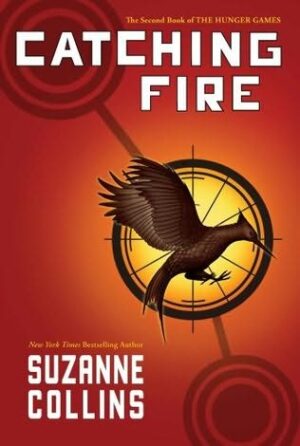There’s not a lot I can say about Catching Fire without massively spoiling the first book, The Hunger Games. I will say that this planned trilogy is turning out a bit like the original Star Wars movies: the first one was exciting and innovative, while the second one is darker, more complex, and paves the way for a third installment. I’m a Return of the Jedi fan, myself, so hopefully this trilogy will also conclude with a dance party.
If you’ve read The Hunger Games, click though! I won’t spoil Catching Fire in the post itself, cross my heart, but watch out for the comments.
When last we left our heroes, Katniss Everdeen and Peeta Mellark, they had done the impossible and both survived the Hunger Games. Turns out, the Capitol would rather allow two survivors than have none at all, but Katniss and Peeta are now personae really, really non gratae. Totalitarian governments don’t like being gamed by anybody, much less teenagers who are already national heroes. Harder to get out of the way discreetly. Still, Katniss and Peeta enjoy the traditional prizes: houses, money, food for their families. But their friends and neighbors are still starving, and mutterings of rebellion mean that the government is keeping a close eye on Katniss and Peeta.
Where The Hunger Games was a romp–a violent romp with gut-wrenching pathos, but essentially a great adventure story–Catching Fire is a thriller. In The Hunger Games, Katniss’s big breakthrough is that she learns about trust. In Catching Fire, she learns about the layers of secrets that make up her society and even her friends. The 74th Annual Games were the be-all and end-all of the first book, at least until the last few pages; here, we step back, and the 75th Annual Games become one cog of many in the great machine. I think Collins is pacing her series on purpose; the books are growing up as Katniss does.
Still, Collins doesn’t pull her punches in either book. The characters are all playing for high stakes–never anything less than life, and often more–so Collins tells her story without glossing over the violence and emotional pain she needs to make her grand scale so vivid. As we realize that Collins isn’t going to keep her characters safe because we love them, our stakes in the books increase, too. I don’t regularly cry over books, but so far, both of these have gotten me sniffling.
What did you think? I’m dying to discuss details in the comments.
I’m also going to spread the love: I have one U.S. hardcover of Catching Fire to give away, to the first person who leaves a comment stating that they want the book. If you are that person, send your mailing address to megan[dot]messinger[at]macmillan[dot]com. It’s in pretty good shape–it was only in my purse for about half an hour before I sat down and read it straight through!
Megan Messinger is a production assistant here at Tor.com, a job that is kind of like competing in the Hunger Games. She is learning to play the fiddle.










